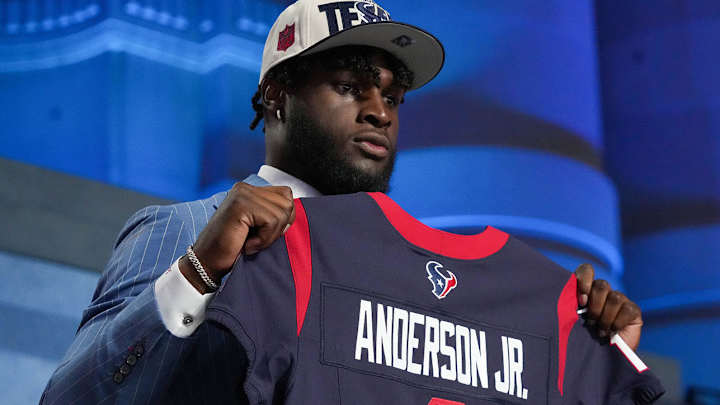Texans Push in Chips on Aggressive Draft Night Instead of a Patient Rebuild

In moving on from Deshaun Watson—which we realize the Texans had to do—the franchise put itself through organizational hell. The Texans have since made two snap coaching changes, each after a year. They parted ways with a machiavellian executive, Jack Easterby, after a public power struggle. The team separated itself from all of its most notable players and any distant memory of what a functioning program looked like.
And so, the 2022 and ’23 drafts, in which they had four total first-round picks, were supposed to be a reward of sorts and a sign of healing to come.
What actually ensued Thursday is a matter of perspective. Certainly, the Texans will tell you that they got the best offensive player in the draft and the best defensive player in the draft by selecting Ohio State quarterback C.J. Stroud at No. 2 and Alabama pass rusher Will Anderson Jr. at No. 3. We will likely read piece after piece about how they are “all in” and about how they commanded the draft board. Insert your sports meme cliché, likening Nick Caserio to the pirate in the boat proclaiming I am the captain now.

But did anyone else come out of Thursday night feeling like their aggressiveness was not only premature but a little irresponsible given how much longer they could have spread out their capital from the Watson trade once they got a sense of what new coach DeMeco Ryans really needed? Am I the only one who thought the Texans gave up way, way too much to come back up from No. 12 (the pick they got from the Browns) to No. 3?
Let’s start from the beginning, where the Texans didn’t bother to trade up for the No. 1 pick, despite knowing they needed a quarterback. Letting the Panthers leapfrog them immediately placed them in a position to pick the player whom Frank Reich, Josh McCown, Jim Caldwell, Thomas Brown and a fleet of other smart coaches in Carolina didn’t want, after an exhaustive process.
Then, in a desperation move to come back up to No. 3, they traded a 2024 first-round pick to the Cardinals as a sweetener. I am as big a fan of Ryans as anyone, and viewed his hiring by the Texans as a complete and total slam dunk. But, the organization’s future now hinges on Ryans being so good in his first year with a rookie quarterback that the Cardinals don’t wind up with a top-five first-rounder the following year on their dime. Since 1990, there have been 13 teams that have won nine or more games with a rookie quarterback. We’re mostly talking about the Steelers of the early 2000s, the Cowboys with a fortress for an offensive line, Russell Wilson with the Legion of Boom and Robert Griffin III running a scheme no one had seen in the NFL before.
That places Stroud in some heady company. That places Ryans, who signed a six-year contract, likely with the knowledge that this was going to be a long-term project, in a bit of debt before he gets his feet on the practice field.
The hope is that I’m dead wrong. Houstonians have been through enough. They watched DeAndre Hopkins get traded and J.J. Watt ask for a reprieve from workplace torture, viewing a trip to the Cardinals—arguably the worst-run franchise in the NFL—as an improvement. They watched the team get purposefully steered into the gutter with no certainty that the general manager who put them there could draft his way out.
In drafting Stroud on Thursday, the Texans were saying the worst of it is over. In trading back up for Anderson, they’re saying that its playoffs or bust in Year 1 for a coach who has never been a head coach, for a quarterback who has never been an NFL quarterback, and for what’s left of a roster that was taught how to win in the league by *checks notes* Lovie Smith and David Culley.
There is a sound argument to be made that a team needs to be all in every season. If your counter-argument to this column is that sometimes a franchise just needs a facelift, it’s one I’ll buy. I can think of another franchise—the Titans—that missed out on a sterling opportunity Thursday night to invigorate its team and city by making a big move but chose to sit on its hands.
The Texans needed a good day. They needed to own something. They needed to win for once, after being abandoned by their quarterback, their best players and their top executives. I think they may have celebrated too soon. I think the Watson trade could have been more of a font of draft equity over the long haul, the way someone like Eagles GM Howie Roseman can seemingly make the haul from one trade last for half a decade. I think that option may have been smarter than trying to erase a bad taste in everyone's mouth all at once.
